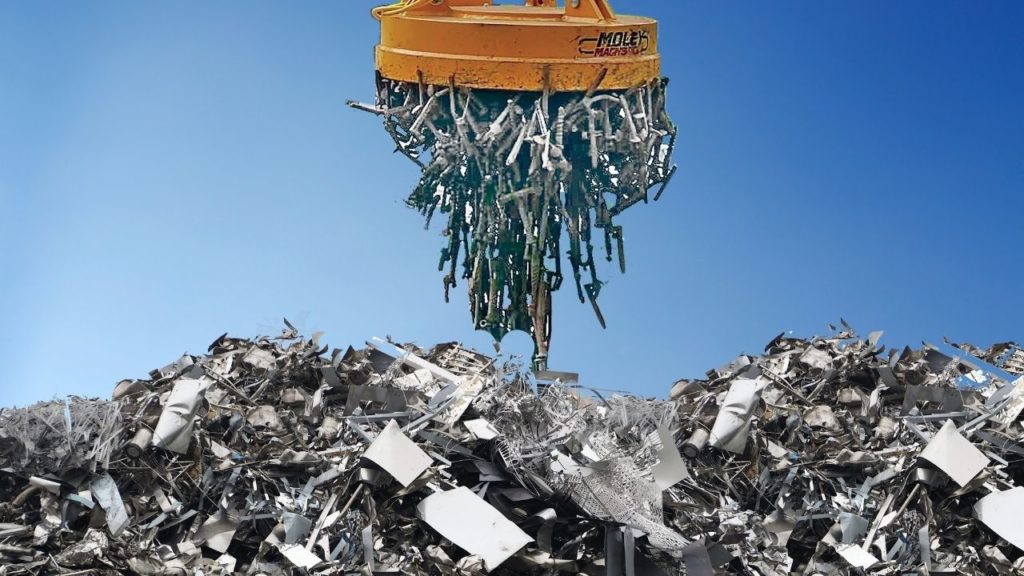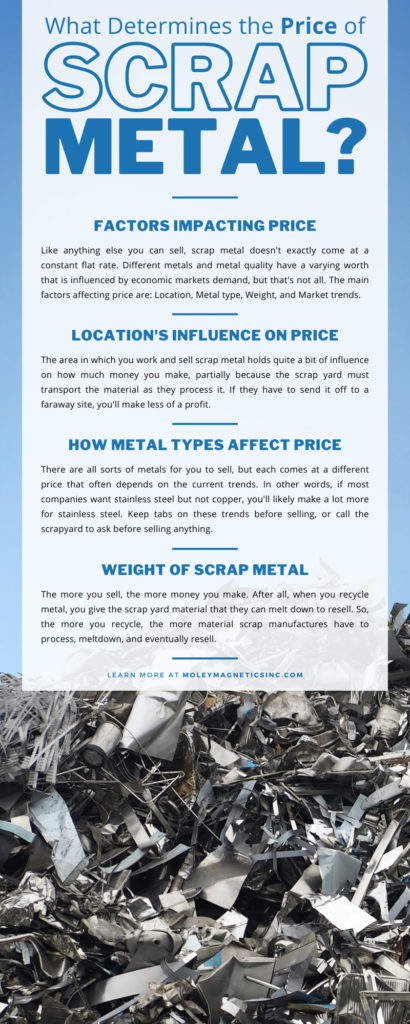
What Determines the Price of Scrap Metal?
Selling scrap metal is an easy way for many industrial companies to make money. Construction, food packaging, and automotive industries are just some of the many business types that often have scraps left over after finishing a job. The question is, what determines the price of scrap metal? Discover what factors influence these prices, plus several additional reasons you need to start selling your scrap material.
Factors Impacting Price
Like anything else you can sell, scrap metal doesn’t exactly come at a constant flat rate. Different metals and metal quality have a varying worth that is influenced by economic markets demand, but that’s not all. The main factors affecting price are:
- Location
- Metal type
- Weight
- Market trends
Some of these factors are interrelated to one another. For example, current market trends—supply and demand economics—may also influence trade. Additionally, the type of metal you’ll make the most money for depends on market demand. By gathering this information, selling becomes a bit easier, and you’ll also know how to determine when to sell.
Location’s Influence on Price
The area in which you work and sell scrap metal holds quite a bit of influence on how much money you make, partially because the scrap yard must transport the material as they process it. If they have to send it off to a faraway site, you’ll make less of a profit.
Pro Tip
Since many scrap yards do this processing overseas, you should aim to search for a scrapyard near a port; this means less transportation and more money for you.
How Metal Types Affect Price
There are all sorts of metals for you to sell, but each comes at a different price that often depends on the current trends. In other words, if most companies want stainless steel but not copper, you’ll likely make a lot more for stainless steel. Keep tabs on these trends before selling, or call the scrapyard to ask before selling anything.
Pro Tip
Machinery like a magnetic hoist attachment will help you sort your metals as you determine what to sell and what to hold on to for the time being.
Weight of Scrap Metal
The more you sell, the more money you make. After all, when you recycle metal, you give the scrap yard material that they can melt down to resell. So, the more you recycle, the more material scrap manufactures have to process, meltdown, and eventually resell.
Pro Tip
If possible, it’s always best to save all the scrap metal you can and sell it when the mark is high. You will make more because of the increase in demand and because there’s more material.
Current Market and Economic Trends
When industries like construction have little need for metal because of a lull in the market, scrap yards make less money, which means less profit for you. Like they say in stocks, “Sell high and buy low!” Focus on market trends so that you can sell your scrap when demand is high to ensure you get more bang for your buck.
Time of Year
Most industrial-based businesses notice slower business when temperatures drop—construction projects just about pause entirely in the country’s northern parts during winter. Since you’ll make less for your scrap in the winter, you should hold onto it until the spring, at which point you’ll see that increase in prices you’ve been waiting for.
International Trade
Both China and India import much of the scrap metal we produce, which means you’ll notice a spike in profits as their demand increases. However, changes in foreign policy or decreases in demand can cause those significant profits to drop.
If you notice the scrap price is at an all-time high, it’s best to sell. While it’s always possible that prices will continue to climb, it’s just as likely that a sudden shift will cause them to plummet. When in doubt, investigate what’s going on with the global economy and trade.
Other Reasons To Recycle Scrap
The profit you make is enough to sell your scrap since this means more money to reinvest into the business. You can buy better machinery, hire additional employees, or find another way to improve your company with that influx of cash. And this isn’t the only benefit you’ll notice. Other reasons to sell scrap include:
- Helping the environment
- Decluttering your property
- Boosting the economy
Once metal becomes scrap, you no longer need it. Instead, sell it to benefit both your company and your surrounding community. We’ve already touched a bit on these reasons, but let’s dive deeper into each one.
You Help the Environment
When you recycle scrap metal, you improve your environmental footprint since this reduces the amount of non-renewable resources we mine. And as you become more environmentally friendly, you’ll also boost your company’s reputation in the community.
It Declutters Your Property
As you hold onto all that unnecessary scrap, you’ll waste space within your business. Not only that, but this could also create safety hazards if the material is lying around—employees could cut themselves on a sharp surface. This could lead to legal fees and all sorts of issues you’d easily avoid by selling that scrap to a company that can recycle it.
It Boosts the Economy
As we’ve discussed, selling your scrap metal boosts the economy because scrap yards can melt it down and resell those ingots to construction, automotive, and other companies looking to buy. It’s a cyclical process. As demand for specific metals shifts, so does the type of metal you’re more inclined to sell, which ultimately meets the market’s needs.
Who Is Moley Magnetics?
At Moley Magnetics, we sell scrap lifting magnets, concrete pulverizers, excavator scrap shears, waste handling grapples and more, which makes collecting all that scrap a lot more efficient. As industry leaders, you can see all the machinery we have that scrap, demolition, and other similar company types need to get their work done. And when you buy our machinery, you’ll also have access to our 24/7 repair services.
With the right machinery, collecting scrap becomes more manageable, enabling you to sell it to make a great profit. Before selling, remember what determines scrap metal price: market trends, location, international trade, and more! By focusing on those price-determining factors, you’ll have extra cash to spend on all your business needs.


